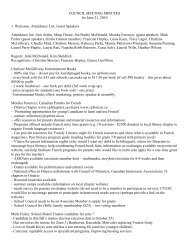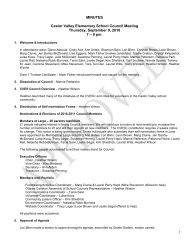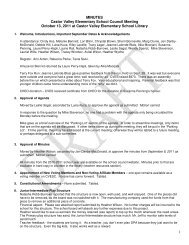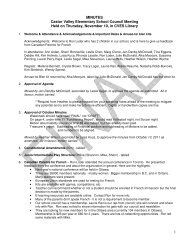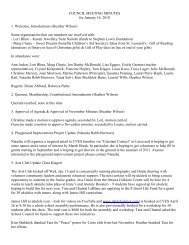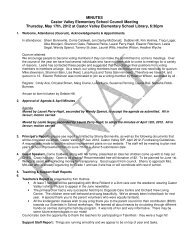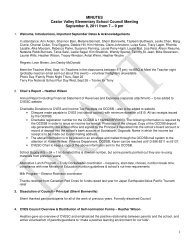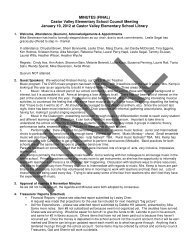developed by world renowned child psychologist, prof. paula barrett
developed by world renowned child psychologist, prof. paula barrett
developed by world renowned child psychologist, prof. paula barrett
Create successful ePaper yourself
Turn your PDF publications into a flip-book with our unique Google optimized e-Paper software.
DEVELOPED BY WORLD<br />
RENOWNED CHILD PSYCHOLOGIST,<br />
PROF. PAULA BARRETT<br />
Young Children 4 to 7 Yrs<br />
(JK-Gd 1)<br />
Children - 7 to 11 Yrs (Gd. 2-6)<br />
Youth - 12 to 16 Yrs (Gd. 7-11)<br />
Friends for Life is the only<br />
anxiety prevention program acknowledged<br />
<strong>by</strong> the World Health Organization<br />
with over 15 years of comprehensive<br />
research evaluation and practice.<br />
Phone: 613-692-3764<br />
E-mail contactus@friendsrt.com<br />
Website: www.friendsrt.com
FUN FRIENDS AND FRIENDS FOR LIFE PROGRAMS:<br />
The evidence-based FRIENDS for Life social and emotional learning programs<br />
address the cognitive (mind), physiological (body) and learning (behavior) processes<br />
that interact in the development, maintenance and experience of anxiety. FRIENDS:<br />
Assists <strong>child</strong>ren and youth in developing life skills to effectively cope with<br />
difficult and/or anxiety provoking situations<br />
• Normalizes the emotional state of anxiety.<br />
• Builds emotional resilience and problem-solving abilities.<br />
• Encourages peer learning and builds support networks and positive role<br />
models.<br />
• Promotes self-confidence.in dealing with difficult or anxiety-provoking<br />
situations<br />
• Empowers <strong>child</strong>ren, families and teachers with knowledge and skills<br />
CHILDREN AND YOUTH ACQUIRE IMPORTANT SKILLS SUCH AS:<br />
<br />
<br />
<br />
<br />
<br />
<br />
<br />
<br />
<br />
<br />
<br />
Understanding emotions in themselves and other people<br />
Recognizing signs of anxiety and body clues for anxiety<br />
Learning ways to relax and become more self-aware<br />
Understanding how their thoughts affect their feelings and behaviour<br />
Changing negative “red” thinking into positive “green” thinking<br />
Focusing on the positives in difficult and anxiety provoking situations<br />
Learning problem solving and positive coping strategies<br />
Facing fears and self-rewarding for effort and trying their best<br />
Learning to be kind and empathic and appreciate differences<br />
Developing positive peer relationships, friendships and support teams<br />
Dealing with difficulties, conflicts, bullying and peer pressure<br />
WHY ARE THESE PROGRAMS SO IMPORTANT?<br />
• Children and youth are experiencing increasing levels of pressure and stress<br />
and at younger and younger ages (Dr. K. Kellie Leitch, 2007)<br />
• Anxiety is the most common mental health problem among <strong>child</strong>ren and youth<br />
today, affecting a greater number than Attention Deficit Hyperactivity Disorder,<br />
Conduct Disorder or Substance Abuse Disorder (C. Waddell & al., 2002).<br />
• Only a minority of <strong>child</strong>ren and youth with mental health problems receive<br />
treatment and often only after years of suffering. Anxiety disorders frequently<br />
have a chronic course and persist into adulthood if not treated.<br />
• The consequences of untreated anxiety are serious and include; lower<br />
educational and vocational achievement, impaired relationships, being bullied<br />
more than their peers, and a greater risk for depression, alcohol abuse, and<br />
cigarette smoking (Dadds et al.,1997; March et al.1998; Muris et al., 2000;<br />
Murray et al., 1996; Sareen, 2005; Wittchen, 1998).<br />
2 Austin Resilience Development Inc., PHRC Accredited FRIENDS training partner<br />
Ph: 613-692-3764 E-Mail: contactus@friendsrt.com Website: www.friendsrt.com
DO THESE PROGRAMS WORK?<br />
A wealth of research and practical experience in schools and clinics <strong>world</strong>-wide has<br />
shown that:<br />
<br />
<br />
<br />
<br />
<br />
<br />
Early intervention reduces the onset of youth anxiety and depression.<br />
Exposing anxious <strong>child</strong>ren to FRIENDS as part of their normal school<br />
curriculum is likely to significantly reduce the risk of developing an anxiety<br />
disorder.<br />
Children with moderate or normal levels of concern benefit from the program<br />
<strong>by</strong> acquiring resilience to emotional stress that can help them lifelong.<br />
FRIENDS significantly increases <strong>child</strong>ren‟s level of self-esteem while reducing<br />
their feelings of worry and depression.<br />
Up to 80% of <strong>child</strong>ren showing signs of an anxiety disorder no longer display<br />
those signs for up to 6 years after completing the program.<br />
“FRIENDS for Life” programs are best practice for the prevention and<br />
treatment of anxiety and depression in <strong>child</strong>ren and youth.<br />
WHAT MAKES FRIENDS DIFFERENT?<br />
<br />
<br />
<br />
<br />
FRIENDS for Life is the only program of its kind that is recognized <strong>by</strong> the<br />
World Health Organization.<br />
FRIENDS is supported <strong>by</strong> ongoing research <strong>by</strong> Dr. Paula Barrett and her<br />
research team with a demonstrated preventative effect.<br />
FRIENDS is a positive program that equips <strong>child</strong>ren with skills to overcome<br />
daily challenges and negative life events which we all encounter.<br />
FRIENDS is effective at all intervention levels; as a universal anxiety<br />
prevention program delivered in the classroom, as an early intervention<br />
program for <strong>child</strong>ren and youth with anxiety concerns, and as a treatment<br />
program for <strong>child</strong>ren and youth with diagnosed anxiety disorders.<br />
ABOUT THE AUTHOR – Dr. PAULA BARRETT:<br />
<br />
<br />
<br />
Is internationally recognized as a prominent scholar and is a Professor of<br />
Education at the University of Queensland.<br />
Is a groundbreaking researcher in the field of <strong>child</strong> psychology and is<br />
internationally acclaimed for her work in the field of <strong>child</strong> and youth anxiety.<br />
Is a practitioner in the field of <strong>child</strong> psychology and the founder and director of<br />
the innovative research-based clinic, Pathways Health and Research Centre.<br />
3 Austin Resilience Development Inc., PHRC Accredited FRIENDS training partner<br />
Ph: 613-692-3764 E-Mail: contactus@friendsrt.com Website: www.friendsrt.com
Has authored and evaluated the well-known FRIENDS for Life, FUN FRIENDS,<br />
and FOCUS programs for the prevention and treatment of <strong>child</strong>hood and<br />
adolescent anxiety and depression.<br />
Was a finalist for the Australian of the Year Queensland Award, Queensland in<br />
2008; and a Finalist in the Queenslander of the Year Award for her<br />
contribution to the well-being of <strong>child</strong>ren and to the community.<br />
FRIENDS PROGRAM STRUCTURE<br />
The program consists of three developmentally sensitive versions:<br />
FUN Friends (Young Children) JK - Gd. 1 4 - 7 years<br />
Friends for Life (Children) Gd. 2 - 6 8 - 11 years<br />
Friends for Life (Youth) Gd. 7-11 12 - 16 years<br />
An overview of FRIENDS<br />
Why is it called FRIENDS?<br />
F = Feelings<br />
R = Remember to Relax<br />
I = I can do it! I can try my best!<br />
(Inner Helpful Thoughts)<br />
E = Explore Solutions and<br />
Coping Step Plans<br />
N = Now reward yourself!<br />
You‟ve done your best!<br />
D = Don‟t forget to practice!<br />
S = Smile! Stay calm for Life!<br />
The word „FRIENDS‟ helps <strong>child</strong>ren and youth to<br />
remember each of the skills taught throughout the<br />
program (i.e. each letter stands for a new skill learned).<br />
1. Our body is our FRIEND and tells us when we are<br />
feeling worried or nervous <strong>by</strong> giving us clues.<br />
2. It is important to learn to be our own FRIEND, and<br />
reward ourselves when we try our best.<br />
3. It is important to make FRIENDS, so that we can build<br />
our social support network and feel happier.<br />
4. FRIENDS can help us to cope with difficult situations<br />
more effectively now and for life.<br />
Friends for Life is implemented <strong>by</strong> Certified Group Leader over:<br />
<br />
<br />
<br />
10 sessions (1 - 1.5 hours weekly) + 2 optional booster sessions<br />
2 Parent Sessions are included in the Group Leader Manual<br />
Parent Sessions are delivered <strong>by</strong> the Group Leader<br />
FUN FRIENDS is implemented <strong>by</strong> Certified Group Leader over:<br />
<br />
<br />
12 play-based sessions ( 1 hour weekly)<br />
Parent Guide with activities for parent to complete with <strong>child</strong><br />
4 Austin Resilience Development Inc., PHRC Accredited FRIENDS training partner<br />
Ph: 613-692-3764 E-Mail: contactus@friendsrt.com Website: www.friendsrt.com
An Overview of Concepts Taught in the Programs<br />
# Fun Friends<br />
4 - 7 yrs<br />
1<br />
• Sense of Identity –Who am I?<br />
• Feeling scared is OK; we can all<br />
learn to be brave<br />
• Being brave = looking people in<br />
the eye, smiling, saying hello with<br />
a brave voice, trying your best<br />
• We all share similarities and<br />
differences<br />
2 • Identification of feelings in self and<br />
others<br />
• Role-play of feelings<br />
• Normalization of all feelings<br />
• Making happy feelings grow<br />
3 • Paying attention to other people‟s<br />
feelings – parents, siblings,<br />
grandparents, teachers, friends<br />
• Helping other people feel better<br />
(empathy training)<br />
• Recognizing other‟s feelings<br />
4 • Paying attention to what your body<br />
is telling you. “Listen”!!<br />
• Breathing slowly/milkshake<br />
bubbles!<br />
• Learning relaxation games<br />
5 • Understanding how thoughts and<br />
feelings affect behaviour<br />
• Understanding self-talk - helpful<br />
(green) thoughts make us feel<br />
strong, brave and happy; unhelpful<br />
(red) thoughts make us feel sad,<br />
worried or upset Unhelpful “RED”<br />
thoughts – STOP!<br />
• Helpful “GREEN” thoughts – GO!<br />
• Attention training<br />
6 • Changing unhelpful red thoughts<br />
into more positive and helpful<br />
green thoughts<br />
• Throwing away “red” thoughts can<br />
be so easy<br />
7 • Learning to do things one step at a<br />
time<br />
• Breaking hard things down into<br />
lots of little steps<br />
• Learning to be brave!<br />
Child – Friends for Life<br />
7 – 11 yrs<br />
• Working in groups<br />
• Feeling confident and brave<br />
• Getting to know one another and<br />
interacting<br />
• Understanding and accepting<br />
differences<br />
• Setting goals to achieve<br />
• Identifying happy experiences<br />
• Understanding our own and other<br />
people‟s feelings<br />
• Thinking in powerful or helpful ways<br />
• Understanding how thoughts and<br />
feelings affect behaviour<br />
• Listening to our body‟s clues to<br />
understand feelings<br />
• Different methods of relaxation –<br />
progressive muscle relaxation, deepbreathing,<br />
using relaxation scripts,<br />
the importance of rest and quiet time.<br />
• Exploring what makes us happy<br />
• Understanding self-talk - helpful<br />
(green) thoughts make us feel strong,<br />
brave and happy; unhelpful (red)<br />
thoughts make us feel sad, worried<br />
or upset<br />
• Paying attention to positive thoughts<br />
and things<br />
• Challenging unhelpful thoughts<br />
• Changing unhelpful thoughts into<br />
helpful thoughts<br />
• Exploring ways to cope<br />
• Coping step plans (breaking down<br />
difficult things into smaller steps)<br />
• The importance of role models and<br />
support teams<br />
• 6-stage problem-solving plan<br />
(identifying the problem and possible<br />
solutions, listing possible<br />
consequences, picking the best<br />
solution, putting the plan into action,<br />
evaluating the results)<br />
• Rewarding ourselves for trying<br />
(reward for effort is important)<br />
• Thinking like a winner<br />
• Using humour to deal with different<br />
situations<br />
Youth – Friends for Life<br />
12 - 16 yrs<br />
• Working in groups<br />
• Feeling confident and brave<br />
• Getting to know one another and<br />
interacting<br />
• Understanding and accepting<br />
differences<br />
• Setting goals to achieve<br />
• Identifying happy experiences<br />
•<br />
• Self-esteem and feelings<br />
• Self-confidence<br />
• Recognizing personal<br />
achievements and strengths<br />
• Safety cues to help us cope<br />
• Understanding our own and other<br />
people‟s feelings<br />
• Thinking in powerful or helpful<br />
ways<br />
• Understanding how thoughts and<br />
feelings affect behaviour<br />
• Verbal and non-verbal<br />
communication<br />
• Learning to make good friendships<br />
• Listening to our body‟s clues to<br />
understand feelings<br />
• Different methods of relaxation –<br />
progressive muscle relaxation,<br />
deep-breathing, using relaxation<br />
scripts, rest and quiet time.<br />
• Using humour<br />
• Exploring what makes us happy<br />
• Understanding self-talk - helpful<br />
(green) thoughts make us feel<br />
strong, brave and happy; unhelpful<br />
(red) thoughts make us feel sad,<br />
worried or upset<br />
• Paying attention to positive<br />
thoughts and things<br />
• Challenging unhelpful thoughts<br />
• Changing unhelpful thoughts into<br />
helpful thoughts<br />
• Exploring ways to cope<br />
• Coping step plans (breaking down<br />
difficult things into smaller steps)<br />
• Mindfulness and attention training<br />
• Looking at situations more<br />
positively, while focusing on other<br />
people (interpersonal), yourself<br />
(intrapersonal), and surrounding<br />
environment (environmental)<br />
• The importance of role models and<br />
support teams<br />
• Dealing with conflict using the<br />
CALM plan<br />
• Understanding conflict styles<br />
• Managing bullying<br />
8 • How to be friendly and make new<br />
friends<br />
• Being a good friend: smile, share,<br />
help, listen<br />
• Practicing the skills learned in the<br />
FRIENDS program<br />
• Planning ahead for difficult situations<br />
• Staying calm<br />
• Being confident and brave<br />
• Positive affirmations about self<br />
• 6-stage problem-solving plan<br />
(identifying the problem and<br />
possible solutions, listing possible<br />
consequences, picking the best<br />
solution, putting the plan into<br />
action, evaluating the results)<br />
• Reward ourselves for trying<br />
5 Austin Resilience Development Inc., PHRC Accredited FRIENDS training partner<br />
Ph: 613-692-3764 E-Mail: contactus@friendsrt.com Website: www.friendsrt.com
9<br />
• We should reward ourselves for<br />
doing something brave and trying<br />
new things.<br />
• Putting the skills all together<br />
• Using the FRIENDS plan to help<br />
ourselves and others<br />
• Practicing the skills learned in<br />
FRIENDS program<br />
• Planning ahead for difficult<br />
situations<br />
• Staying calm<br />
• Positive affirmations about self<br />
10 • The importance of role models<br />
• The importance of spending<br />
quality time together doing fun<br />
activities with teachers, parents,<br />
siblings, and extended family<br />
11 • Support teams and support<br />
networks<br />
12 • Learning to be happy with our<br />
efforts.<br />
• Celebrating finishing the FUN<br />
FRIENDS program.<br />
• Preparing for future challenges<br />
• Party to celebrate new skills learned<br />
• Booster Session #1<br />
Review and Practice skills<br />
• Booster Session #2<br />
Review and Practice skills<br />
• Putting it all together<br />
• Using the FRIENDS plan to help<br />
ourselves and others<br />
• Preparing for future challenges<br />
• Party to celebrate skills learned<br />
• Booster Session #1<br />
Review and Practice<br />
• Booster Session #2<br />
Review and Practice<br />
FRIENDS TRAINING AND CERTIFICATION<br />
• Austin Resilience Development Inc. is the<br />
accredited Pathways Health and Research Centre<br />
FRIENDS training partner for Ontario, Quebec, the Maritimes, Manitoba,<br />
Saskatchewan, the Northwest Territories, the Yukon and Nunavut.<br />
• FRIENDS trainings will be of interest to classroom teachers, guidance counselors,<br />
special education teachers, social workers, <strong>psychologist</strong>s, <strong>child</strong> and youth<br />
workers, early years educators, health <strong>prof</strong>essionals and other qualified<br />
<strong>prof</strong>essionals working with <strong>child</strong>ren and/or youth.<br />
FRIENDS Regional Training Workshops (selected cities and provinces)<br />
• Professionals working with <strong>child</strong>ren or youth in educational and community health<br />
and social service agencies can participate in an interactive FRIENDS training<br />
workshop offered in selected cities and provinces. Information about these<br />
trainings is posted on the Austin Resilience Development Inc. website at<br />
www.friendsrt.com .<br />
FRIENDS Staff In-Services Training Workshops (On-site)<br />
• If your school or agency has a number of staff wanting to be trained in the<br />
FRIENDS program, an accredited FRIENDS trainer can be sent to your school or<br />
community agency to run a staff in-service. For information please contact Austin<br />
Resilience Development Inc. at:<br />
Phone: 613-692-3764<br />
E-mail contactus@friendsrt.com<br />
Address: P.O. Box 302, North Gower<br />
Ontario, Canada K0A 2T0<br />
Website: www.friendsrt.com<br />
6 Austin Resilience Development Inc., PHRC Accredited FRIENDS training partner<br />
Ph: 613-692-3764 E-Mail: contactus@friendsrt.com Website: www.friendsrt.com



